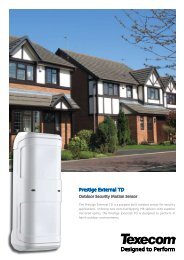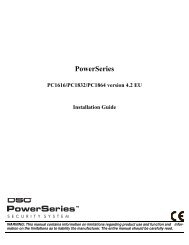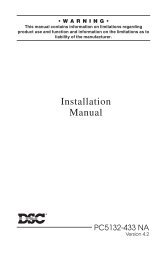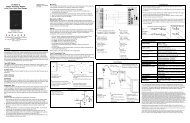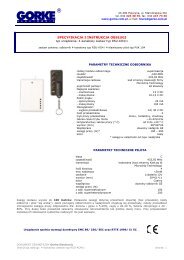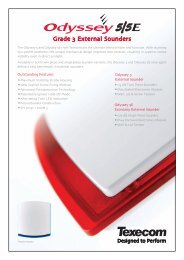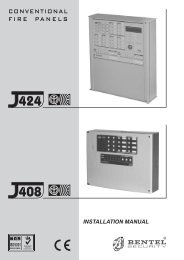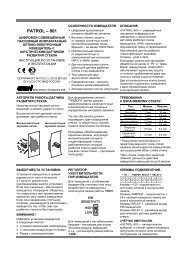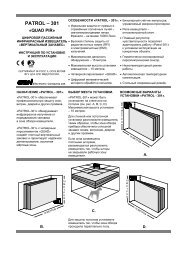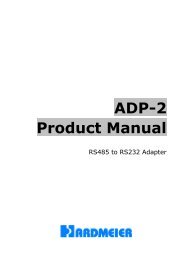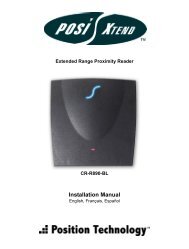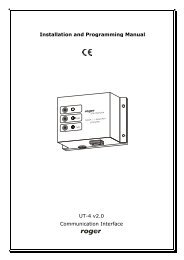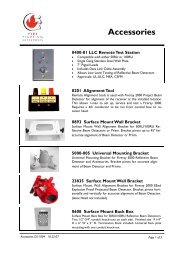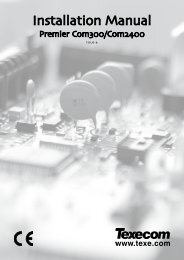MASTER USER MANUAL - ADT Security
MASTER USER MANUAL - ADT Security
MASTER USER MANUAL - ADT Security
You also want an ePaper? Increase the reach of your titles
YUMPU automatically turns print PDFs into web optimized ePapers that Google loves.
THANK YOU FOR VOTING TEXECOM<br />
<strong>MASTER</strong> <strong>USER</strong> <strong>MANUAL</strong><br />
<strong>Security</strong> Control Panels with Integrated<br />
Communicator<br />
INS141-7
Contents<br />
Premier 412/816/832 Master User Manual<br />
Contents<br />
1. About the Alarm System ............................ 3<br />
Introduction ......................................................................3<br />
About this Manual............................................................ 3<br />
Fire Detection................................................................... 3<br />
Monitoring ........................................................................ 3<br />
Zones and Partitions........................................................ 3<br />
Access Codes.................................................................. 3<br />
Remote Keypads ..............................................................4<br />
Keypad Types .................................................................. 4<br />
Keypad Layouts ............................................................... 4<br />
Function Keys .................................................................. 5<br />
Emergency Keys.............................................................. 5<br />
2. Operating the Alarm System ..................... 6<br />
Introduction ......................................................................6<br />
Access Codes.................................................................. 6<br />
Arming & Disarming the Alarm System...........................6<br />
Checking if the System is Ready to Arm ........................ 6<br />
Away Arming.................................................................... 6<br />
Stay Arming ..................................................................... 6<br />
Cancelling the Arming Process....................................... 7<br />
Disarming During Entry ................................................... 7<br />
Disarming when not in Entry ........................................... 7<br />
Disarming after an Alarm................................................. 7<br />
Auto Stay Arming............................................................. 7<br />
Changing between Delayed and Instant Stay ................ 7<br />
Arming and Disarming Partitions ....................................8<br />
Away Arming Partitions ................................................... 8<br />
Stay Arming Partitions ..................................................... 8<br />
Disarming Partitions ........................................................ 8<br />
Changing to another Partition ......................................... 9<br />
Bypassing Zones..............................................................9<br />
Manually Bypassing Zones ............................................. 9<br />
Unbypassing Zones......................................................... 9<br />
Group Bypass ................................................................ 10<br />
Quick Bypass and Arm.................................................. 10<br />
3. User Functions Menu ............................... 11<br />
Reset Alarms ..................................................................11<br />
Last Alarm Log ...............................................................11<br />
Service Faults.................................................................11<br />
Acknowledging a New Service Fault ............................ 11<br />
View Service Faults........................................................ 11<br />
Anti-code Reset..............................................................12<br />
Toggle Chime On and Off ..............................................12<br />
Change User Code.........................................................13<br />
View Log (LCD Only)......................................................13<br />
Abort Communications ..................................................13<br />
4. System Program Menus........................... 14<br />
Programming Text (LCD Only)...................................... 14<br />
Programming Users .......................................................15<br />
Program User !"................................ 16<br />
User Options 1 !#................................ 17<br />
User Options 2 !$................................ 17<br />
User Options 3 !%................................ 17<br />
User Text (LCD Only) !&................................ 18<br />
Program Standard Users !'................................ 18<br />
System Tests & Utilities .................................................19<br />
Walk Test (" .................. 20<br />
Test Speakers & Outputs (# .................. 20<br />
Send Test Call ($ .................. 20<br />
Enable Remote/Engineer Access (% .................. 20<br />
Start Call Back (& .................. 20<br />
Program Time (' ...................20<br />
Program Date () ...................20<br />
Program Banner Text (LCD only) (* ...................20<br />
Print 100 Events (! ...................20<br />
Exit Program Mode (( ...................20<br />
5. Fire Safety & Maintenance .......................21<br />
Fire Safety .......................................................................21<br />
Fire Alarm Operation ......................................................21<br />
Household Fire Safety Audit ..........................................21<br />
Fire Escape Planning .....................................................21<br />
Maintenance ...................................................................22<br />
Glossary..........................................................................22<br />
6. Installation Records..................................23<br />
Control Panel..................................................................23<br />
Keypads..........................................................................23<br />
Timers .............................................................................23<br />
Users...............................................................................23<br />
Zones ..............................................................................24<br />
DO NOT REMOVE COVER<br />
!<br />
MAINS VOLTAGES INSIDE<br />
No user serviceable parts, servicing by qualified<br />
personnel only.<br />
2 INS141
Premier 412/816/832 Master User Manual<br />
About the Alarm System<br />
1. About the Alarm System<br />
Introduction<br />
Your alarm system consists of a control panel, one or more<br />
keypads and various detectors and sensors. The control<br />
panel will normally be mounted out of sight in a utility room<br />
or basement etc. The control panel houses the system’s<br />
electronics and stand-by battery. There is normally no<br />
reason for anyone except an installer or service person to<br />
have access to the control panel.<br />
The remote keypad is used to send commands to the<br />
system and to display the current system status via the<br />
various coloured lights (LED’s). The keypad also provides<br />
audible feedback each time a key is pressed. Each keypad<br />
will be mounted in convenient locations inside the protected<br />
premises, near designated points of entry/exit.<br />
Read this manual carefully and have your installer instruct<br />
you on your system’s operation. Become familiar with the<br />
features that have been implemented on your system. All<br />
users of this system should be equally instructed in its use.<br />
About this Manual<br />
This manual is a thorough explanation of all system<br />
functions, including troubleshooting and programming<br />
Access codes in addition to performing basic system<br />
functions. Most users of the system will not need to know all<br />
of this information. The section of this manual, titled<br />
“Operating your Alarm System” explains general system<br />
concepts and instructs the user on how to arm and disarm<br />
the system and bypass zones. The remaining sections of the<br />
manual are reserved for more detailed system information.<br />
Fire Detection<br />
This equipment is capable of monitoring fire detection<br />
devices such as smoke detectors and providing a warning<br />
alarm if a fire condition is detected. Good fire detection<br />
depends on having adequate numbers of fire detectors<br />
placed in appropriate locations. This equipment should be<br />
installed in accordance with the relevant local authority fire<br />
regulations. Carefully review the “Fire Escape Planning”<br />
guidelines in this manual.<br />
"<br />
Your installer must enable the fire detection feature of<br />
this equipment before it will work.<br />
Monitoring<br />
This system is capable of transmitting alarms, troubles and<br />
emergency information over telephone lines to an alarm<br />
monitoring station. If you inadvertently initiate an alarm,<br />
immediately call the Alarm Receiving Centre (ARC) to<br />
prevent an unnecessary response.<br />
"<br />
Your installer must enable the monitoring function<br />
before it will work.<br />
Zones and Partitions<br />
Your installer has divided the protected premises into zones<br />
and partitions. A zone is an area of protection that has one<br />
or more detection sensors connected to it (motion detectors,<br />
glass-break detectors, door contacts or shock sensors). A<br />
single zone might be a room, a hallway or a door or window.<br />
Two or more of these zones will be linked together by the<br />
control panel to form a partition.<br />
A partition is an area of the protected premises. A partition<br />
can be armed and disarmed independently from other<br />
partitions. All of the partitions together form the entire alarm<br />
system. If your alarm system is not divided into partitions<br />
then all devices will be assigned to Partition 1.<br />
Some zones may belong to more than one partition, such as<br />
points of entry/exit and hallways. These are called Global<br />
Zones because they are not assigned to a single partition.<br />
The following table shows the number of zones and<br />
partitions for the Premier 412, 816 & 832 control panels:<br />
Control Panel Partitions Zones Zones (max)<br />
Premier 412 2 4 12<br />
Premier 816 4 8 16<br />
Premier 832 4 8 32<br />
Access Codes<br />
As a user of the alarm system, you will be assigned a 4, 5 or<br />
6 digit Access code. Access codes are used to arm and<br />
disarm the partition(s) to which they are assigned. Some<br />
Access codes can perform additional system functions,<br />
such as programming system options, bypassing zones and<br />
performing system tests.<br />
Your Access code may not allow you to access certain<br />
system functions. For instance, if your code is only allowed<br />
to arm and disarm Partition 1, you will not be able to arm or<br />
disarm other partitions, or the entire system.<br />
Your Access code may also be programmed for Global<br />
Access. A Global Access code can be used at any keypad<br />
and will allow you to arm and disarm any of the partitions<br />
assigned to your code. Alternatively your code may be<br />
programmed for Partition Access. A Partition Access code<br />
will only allow you to arm and disarm the partitions that are<br />
assigned to both the keypad and your code.<br />
The following table shows the number of users for the<br />
Premier 412, 816 & 832 control panels:<br />
Control Panel<br />
Number of Users<br />
Premier 412 32<br />
Premier 816 32<br />
Premier 832 64<br />
INS141 3
About the Alarm System<br />
Remote Keypads<br />
One or more remote keypads will be installed throughout<br />
the protected premises, usually one at each entry/exit door.<br />
Each remote keypad is normally assigned to the partition<br />
that it is going to control. A keypad can be assigned to more<br />
than one partition, if required (global keypad).<br />
Keypad Types<br />
The following keypad types are available:<br />
Premier RKP4: The Premier RKP4 is the standard remote<br />
keypad for the Premier 412 control panel. This remote<br />
keypad has 4 zone indicator lights and four status lights<br />
(Alarm, Service, Armed and Ready).<br />
Premier RKP8: The Premier RKP8 has same features as the<br />
Premier RKP4 but has 8 zone indicator lights. This keypad is<br />
normally used on systems that monitor up to 8 zones.<br />
Premier RKP16: The Premier RKP16 has same features as<br />
the Premier RKP4 but has 16 zone indicator lights. This<br />
keypad is normally used on systems that monitor up to 16<br />
zones.<br />
Premier RKP8 Plus: The Premier RKP8 Plus has all the<br />
features of the standard Premier RKP4 plus dedicated<br />
indications for Fire, Bypass, Instant and Stay. It also features<br />
two programmable zone inputs that can be utilised by your<br />
installer for detection devices close to the location of the<br />
remote keypad. This keypad is normally used on systems<br />
that monitor up to 8 zones.<br />
Premier RKP16 Plus: The Premier RKP16 Plus has same<br />
features as the Premier RKP8 Plus but has 16 zone indicator<br />
lights. This keypad is normally used on systems that monitor<br />
up to 16 zones.<br />
Premier LCD: The Premier LCD has a standard size 32<br />
character back-lit Liquid Crystal Display plus dedicated<br />
indications for Bypass, Service, Ready, Armed and Power. It<br />
also features two programmable zone inputs that can be<br />
utilised by your installer for detection devices close to the<br />
location of the remote keypad. This keypad is normally used<br />
on systems that monitor up to 32 zones.<br />
Premier LCDL: The Premier LCDL has the same features as<br />
the Premier LCD but has a large size 32 character back-lit<br />
Liquid Crystal Display. This keypad is normally used on<br />
systems that monitor up to 32 zones.<br />
Premier LCDP: As Premier LCD with a built in proximity tag<br />
reader.<br />
Premier LCDLP: As Premier LCDL with a built in proximity<br />
tag reader.<br />
Premier 412/816/832 Master User Manual<br />
Keypad Layouts<br />
<br />
<br />
<br />
<br />
<br />
<br />
<br />
<br />
Alarm<br />
Service<br />
1<br />
4 ghi<br />
7 pqrs<br />
Yes<br />
1<br />
4 ghi<br />
7 pqrs<br />
Yes<br />
Alarm<br />
Service<br />
1 2 3<br />
4 5 6<br />
7 8 9 0<br />
1 2 3 4 5 6 7 8<br />
9 10 11 12 13 14 15 16<br />
Fire<br />
1<br />
9<br />
2<br />
10<br />
Bypass<br />
3<br />
11<br />
Zones<br />
4 5<br />
12<br />
13<br />
BY<br />
PASS<br />
MENU<br />
Premier RKP4/8/16<br />
2 abc 3 def<br />
5 jkl<br />
8 tuv<br />
0<br />
<br />
6 mno<br />
9 wxyz<br />
No<br />
<br />
6<br />
14<br />
Instant<br />
Premier RKP8/16 Plus<br />
<br />
7<br />
15<br />
Bypass<br />
Chime<br />
Stay<br />
Area<br />
8<br />
16<br />
Stay<br />
Armed<br />
Ready<br />
ARM<br />
STAY<br />
DISARM<br />
AREA<br />
<br />
<br />
Bypass<br />
2 abc 3 def<br />
5 jkl<br />
8 tuv<br />
0<br />
6 mno<br />
9 wxyz<br />
No<br />
Service<br />
Bypass<br />
Chime<br />
Stay<br />
Area<br />
Armed<br />
Ready<br />
Reset<br />
Menu<br />
Power<br />
Armed<br />
Reset<br />
Menu<br />
Ready<br />
<br />
<br />
<br />
<br />
<br />
<br />
<br />
<br />
<br />
<br />
<br />
<br />
<br />
Premier LCD/LCDL/LCDP/LCDLP<br />
4 INS141
Premier 412/816/832 Master User Manual<br />
# - Alarm Light: If an alarm has occurred whilst the Function Keys<br />
partition/system was armed the Alarm light will illuminate.<br />
The alarm partition/system cannot be Armed until a<br />
standing Alarm has been acknowledged/reset (see Key<br />
“Acknowledging an Alarm” on page 11).<br />
+<br />
$ - Service Light: The Service light will flash when a new fault<br />
occurs and will change to on steady when the fault has<br />
been acknowledged. When the system is free of all faults -<br />
the Service light will be off.<br />
The alarm system cannot be armed until the new faults .<br />
have been acknowledged (see “Service Faults” on page<br />
11).<br />
/<br />
% - Armed Light: The Armed light indicates the armed status of<br />
the partition/system. The Armed light is on when the 0<br />
partitions assigned to the keypad are armed. When the<br />
Armed light is off the partitions are disarmed. The Armed<br />
light will flash as follows:<br />
Partition in Exit: Slow flash (1 second on, 1 second off).<br />
1<br />
Partition is Delayed Stay Armed: Slow flash (1 second on,<br />
1 second off).<br />
Partition is Instant Stay Armed: Fast flash (200<br />
milliseconds on, 200 milliseconds off).<br />
2<br />
& - Ready Light: If the Ready light is on the partition/system is<br />
ready for arming. If the Ready light is off, one or more<br />
3<br />
zones within the partition/system are violated, check the<br />
relevant zones as indicated on the keypads. If the Ready<br />
light is flashing, one or more zones are bypassed or are 4<br />
violated and force-armable.<br />
' - Zone Lights: The zone lights indicate the status of each 5<br />
alarm zone within the partition. When a zone is violated or<br />
in trouble the relevant zone light will illuminate. When a<br />
zone is secure the relevant zone light will be off. "<br />
A keypad can be programmed to blank its display after a<br />
period of time. An Access code may be required to reenable<br />
the display. Otherwise simply press any key.<br />
Zone display is always enabled when the alarm system is in<br />
alarm.<br />
( - Function Keys: See “Function Keys”.<br />
) - Fire: if the Fire light is on with no zone indicators<br />
illuminated, then a fire alarm has occurred from one of the<br />
2-wire smoke sensors. If there is an accompanied zone<br />
indication, the fire alarm has occurred from the smoke<br />
sensor on the indicated zone.<br />
* - Bypass: If the Bypass light is on, one or more zones have<br />
been manually bypassed, (see “Manually Bypassing<br />
Zones” on page 9).<br />
+ - Stay: If the Stay light is on, the partition/system is in the<br />
stay armed mode. The Armed light will also be flashing.<br />
, - Instant: If the Instant light is on, the partition/system is in "<br />
the stay armed mode and the delayed zones (front door<br />
etc) are instant. The Armed light will also be flashing<br />
rapidly.<br />
- - Power Light: The power light is on steady when mains<br />
supply is present and flashes when the system is running<br />
on battery (mains fail).<br />
. - LCD Display: 16 character Liquid Crystal Display (LCD).<br />
/ -0 Proximity Tag Reader: On Premier LCDP and LCDLP only.<br />
About the Alarm System<br />
The remote keypad function keys are described as follows:<br />
Function<br />
The Bypass key is used for either group or manual<br />
bypass of zones (see page 9).<br />
The Menu key is used to access the more advanced<br />
user functions and programming options.<br />
The Arm key is used when away arming the system or<br />
partition.<br />
The Stay key is used when Stay arming the system or<br />
partition.<br />
The Disarm key is used when disarming the system or<br />
partition.<br />
The Area key is normally used when arming and<br />
disarming a particular partition. When the Area key is<br />
pressed on its own the keypad will indicate the armed<br />
status of all partitions.<br />
The Area key can also be used to temporarily switch<br />
the keypad to a different partition, see page 9.<br />
The Chime key is used to enable/disable the chime<br />
feature, see page 12.<br />
The Reset key is used to reset the system after an<br />
alarm or service fault condition, see page 11.<br />
The Yes key is used to arm the system and to select<br />
menu options.<br />
The No key is used when disarming the system or<br />
partition.<br />
When a keypad is in use other keypads will be lockedout<br />
except for emergency functions. The lock-out will<br />
persist 4 seconds after the last key is pressed.<br />
Information tones will be limited to the keypad in use.<br />
Emergency Keys<br />
In case of emergency, the alarm system can provide three<br />
immediate emergency alarms by pressing and holding two<br />
specific keys for three seconds.0<br />
Emergency Alarm<br />
Press Keys<br />
# & %<br />
& & )<br />
* & (<br />
The emergency keys can be individually enabled or<br />
disabled for each keypad on your alarm system by<br />
the installer.<br />
The Panic alarm can be individually programmed for<br />
either audible or silent operation for each keypad.<br />
Emergency commands are detailed on the inside flap<br />
label of each remote keypad.<br />
INS141 5
Operating the Alarm System<br />
Premier 412/816/832 Master User Manual<br />
2. Operating the Alarm System<br />
Introduction<br />
Before attempting to operate the alarm system ensure you<br />
have familiarised yourself with all the arming and disarming<br />
methods covered in this section.<br />
Access Codes<br />
• If you make a mistake whilst entering your Access code,<br />
simply enter the correct Access code.<br />
Arming & Disarming the Alarm System<br />
Checking if the System is Ready to Arm<br />
To help prevent faults during arming, a Ready light has<br />
been provided on each keypad. The Ready light works as<br />
follows:<br />
• If the Ready light is on steady then the alarm system is<br />
ready to be armed.<br />
• If the Ready light is flashing then the alarm system has<br />
bypassed zones and/or Force Armable zones that are<br />
violated, check these zones before proceeding.<br />
• If the Ready light is off then one or more zones are<br />
violated, either secure or bypass these zones before<br />
proceeding. The keypads will display the zones that are<br />
violated:<br />
"<br />
Alarm<br />
Service<br />
1<br />
2<br />
3<br />
Zones<br />
4 5<br />
6<br />
7<br />
8<br />
Armed<br />
Ready<br />
Active zones are indicated by<br />
the relevant zone lights on<br />
LED Keypads<br />
<br />
<br />
<br />
<br />
Active zones are scrolled<br />
in sequence on LCD keypads<br />
If any unbypassed zones that are not enabled for<br />
“Force Arming” are violated at the end of the exit<br />
delay this is termed an exit error and the alarm system<br />
will go into fail set state (internal alarm). If<br />
programmed by the installer the external bell will also<br />
sound. Enter a valid user Access code to silence this<br />
alarm.<br />
A zone will only be armed when ALL associated<br />
partitions are armed but will be disarmed when ANY<br />
associated partition is disarmed.<br />
Away Arming<br />
The Away arming mode is normally used when leaving the<br />
premises. When the system is armed in this mode all<br />
detection zones assigned to your partition(s) will be armed.<br />
The Ready light must be on steady before the alarm system<br />
can be Away armed.<br />
" To Away arm the alarm system proceed as follows:<br />
1<br />
2<br />
3<br />
"<br />
Alarm<br />
Service<br />
Alarm<br />
Service<br />
1<br />
1<br />
2<br />
Enter Access code <br />
Press <br />
2<br />
3<br />
3<br />
Zones<br />
4 5<br />
Zones<br />
4 5<br />
6<br />
6<br />
7<br />
7<br />
8<br />
8<br />
Armed<br />
Ready<br />
Armed<br />
Ready<br />
<br />
<br />
Press <br />
<br />
<br />
The Armed light will flash and the exit tone will sound.<br />
Leave the premises, when the system has armed the<br />
exit tone will stop. The system is now Away armed.<br />
If the Quick Arm feature is enabled, you can omit step<br />
1 from the above procedure.<br />
Stay Arming<br />
The Stay arming mode is normally used when the premises<br />
will be occupied. When the system is armed in this mode all<br />
Interior detection zones assigned to your partition(s) will be<br />
bypassed. Before Stay arming check the following:<br />
• Secure or bypass any perimeter zones that are violated.<br />
• Ensure no perimeter zones are bypassed<br />
unintentionally.<br />
• Ensure no perimeter Force Armable zones are violated<br />
unintentionally.<br />
" To Stay arm the alarm system proceed as follows:<br />
1<br />
2<br />
3<br />
"<br />
Alarm<br />
Service<br />
Alarm<br />
Service<br />
1<br />
1<br />
2<br />
2<br />
3<br />
3<br />
Enter Access code <br />
Zones<br />
4 5<br />
Zones<br />
4 5<br />
6<br />
6<br />
7<br />
7<br />
8<br />
8<br />
Armed<br />
Ready<br />
Press <br />
Armed<br />
Ready<br />
<br />
<br />
<br />
<br />
The alarm system will arm immediately and the Armed<br />
light will flash.<br />
The system is now Stay armed.<br />
If the Quick Arm feature is enabled, you can omit step<br />
1 from the above procedure.<br />
If the system is fitted with a Premier RKP8/16 Plus then<br />
the Stay light will also illuminate when the system is<br />
Stay armed.<br />
6 INS141
Premier 412/816/832 Master User Manual<br />
Cancelling the Arming Process<br />
" To cancel the arming process during the exit delay:<br />
1<br />
2<br />
3<br />
"<br />
Alarm<br />
Service<br />
Alarm<br />
Service<br />
1<br />
1<br />
2<br />
Press <br />
2<br />
3<br />
3<br />
Enter Access code <br />
Zones<br />
4 5<br />
Zones<br />
4 5<br />
6<br />
6<br />
7<br />
7<br />
8<br />
8<br />
Armed<br />
Ready<br />
Armed<br />
Ready<br />
<br />
<br />
Press <br />
<br />
<br />
Arming has been cancelled and the alarm system is<br />
now disarmed.<br />
If the system only has one partition you will not have<br />
to perform step 2.<br />
Disarming During Entry<br />
" To disarm the alarm system during entry, proceed as<br />
follows:<br />
1<br />
2<br />
3<br />
"<br />
Enter the premises via the designated entry point,<br />
the entry tone will sound. Proceed directly to the<br />
remote keypad.<br />
Zones<br />
1 2 3 4 5 6 7 8<br />
Alarm<br />
Armed <br />
Ready <br />
Service<br />
Alarm<br />
Service<br />
1<br />
2<br />
3<br />
Enter Access code <br />
Zones<br />
4 5<br />
6<br />
7<br />
8<br />
Armed<br />
Ready<br />
<br />
<br />
The entry tone will stop and the Armed light will turn off.<br />
The alarm system is now disarmed.<br />
If a valid Access code is not entered before the end of<br />
the entry delay, an alarm will occur.<br />
Disarming when not in Entry<br />
" To disarm the alarm system when not in entry, proceed<br />
as follows:<br />
1<br />
2<br />
3<br />
"<br />
Alarm<br />
Service<br />
Alarm<br />
Service<br />
1<br />
1<br />
The Armed<br />
2<br />
Press <br />
2<br />
3<br />
3<br />
Enter Access code <br />
Zones<br />
4 5<br />
Zones<br />
4 5<br />
6<br />
6<br />
7<br />
7<br />
8<br />
8<br />
Armed<br />
Ready<br />
Armed<br />
Ready<br />
<br />
<br />
Press <br />
<br />
<br />
light will turn off. The alarm system is now<br />
disarmed.<br />
If the system only has one partition you will not have<br />
to perform step 2.<br />
If the Quick Disarm feature is enabled and the system<br />
is Stay armed you can omit step 1 from the above<br />
procedure.<br />
Disarming after an Alarm<br />
Operating the Alarm System<br />
" To disarm the alarm system after an alarm, proceed as<br />
follows:<br />
1<br />
2<br />
Alarm<br />
Service<br />
1<br />
2<br />
3<br />
Enter Access code <br />
Zones<br />
4 5<br />
6<br />
7<br />
8<br />
Armed<br />
Ready<br />
<br />
<br />
<br />
<br />
The system is disarmed and the keypads display the<br />
source of the alarm.<br />
The system must now be reset before you can arm again,<br />
see page 11 for details on resetting alarms.<br />
Auto Stay Arming<br />
If your installer has enabled the Auto Stay feature the system<br />
will automatically Stay arm if the entry/exit zone (front door)<br />
is not activated whilst attempting to Away arm the system.<br />
" To auto Stay arm your alarm system proceed as follows:<br />
1<br />
2<br />
3<br />
Alarm<br />
Service<br />
Alarm<br />
Service<br />
1<br />
1<br />
2<br />
Enter Access code <br />
Press <br />
2<br />
3<br />
3<br />
Zones<br />
4 5<br />
Zones<br />
4 5<br />
6<br />
6<br />
7<br />
7<br />
8<br />
8<br />
Armed<br />
Ready<br />
Armed<br />
Ready<br />
<br />
<br />
Press <br />
<br />
<br />
The Armed light will flash and the exit tone will sound.<br />
Do NOT leave the premises during the exit delay. At<br />
the end of the exit delay the alarm system will Stay arm.<br />
Changing between Delayed and Instant Stay<br />
When Stay arming the system the delayed zones (front door<br />
etc) are normally delayed, i.e., when a delayed zone is<br />
violated it will start the entry delay timer. However, it is<br />
possible to change the delayed zones to instant when the<br />
system is in a Stay armed mode. If a delayed zone is<br />
violated when the system is in the “Instant Stay” mode the<br />
system will generate an alarm immediately.<br />
" To change from Delayed Stay to Instant Stay, proceed<br />
as follows:<br />
1<br />
2<br />
3<br />
"<br />
Alarm<br />
Service<br />
Ensure that the system is Stay armed.<br />
Press and hold the key until you hear the<br />
confirmation tone.<br />
1<br />
2<br />
3<br />
Zones<br />
4 5<br />
6<br />
7<br />
8<br />
Armed<br />
Ready<br />
<br />
<br />
The Armed light will flash quickly.<br />
The system is Instant Stay armed.<br />
If the system is fitted with a Premier RKP8/16 Plus the<br />
Instant light will also illuminate.<br />
INS141 7
Operating the Alarm System<br />
" To change from Instant Stay to Delayed Stay, proceed<br />
as follows:<br />
1<br />
2<br />
3<br />
"<br />
Alarm<br />
Service<br />
Ensure that the system is Instant Stay armed.<br />
Press and hold the<br />
1<br />
2<br />
3<br />
Zones<br />
4 5<br />
6<br />
7<br />
key until you hear the<br />
confirmation tone.<br />
8<br />
Armed <br />
Ready <br />
The Armed light will flash slowly.<br />
The system is Delayed Stay armed.<br />
If your system is fitted with a Premier RKP8/16 Plus the<br />
Instant light will go off.<br />
Arming and Disarming Partitions<br />
This section covers arming and disarming partitions. In<br />
order to use these procedures the following requirements<br />
must be configured:<br />
• The alarm system must be split into one or more<br />
partitions.<br />
• Your Access code must be assigned to more than one<br />
partition.<br />
• The keypad that you use to operate the alarm system<br />
must be assigned to multiple partitions OR your Access<br />
code is enabled for Global Access.<br />
Away Arming Partitions<br />
This option allows you to Away arm one or more partitions.<br />
" To Away arm selected partitions, proceed as follows:<br />
1<br />
2<br />
3<br />
Alarm<br />
Service<br />
Alarm<br />
Service<br />
Alarm<br />
Service<br />
1<br />
1<br />
2<br />
2<br />
3<br />
3<br />
Enter Access code <br />
Zones<br />
4 5<br />
Zones<br />
4 5<br />
6<br />
6<br />
7<br />
7<br />
8<br />
8<br />
Armed<br />
Ready<br />
Press <br />
Armed<br />
Ready<br />
<br />
<br />
<br />
<br />
The Ready light will flash quickly.<br />
Press - to select/deselect partitions,<br />
e.g. Press to select Partition 2.<br />
1<br />
2<br />
3<br />
Zones<br />
4 5<br />
6<br />
7<br />
8<br />
<br />
<br />
Partition 2 is now selected.<br />
4 Press Press <br />
Alarm<br />
Service<br />
1<br />
2<br />
3<br />
Zones<br />
4 5<br />
6<br />
7<br />
8<br />
Armed<br />
Ready<br />
Armed<br />
Ready<br />
<br />
<br />
The Armed light will flash and the exit tone will sound.<br />
Premier 412/816/832 Master User Manual<br />
Stay Arming Partitions<br />
This option allows you to Stay arm one or more partitions.<br />
" To Stay Arm selected partitions, proceed as follows:<br />
1<br />
2<br />
3<br />
Alarm<br />
Service<br />
Alarm<br />
Service<br />
1<br />
2<br />
3<br />
Enter Access code <br />
Zones<br />
4 5<br />
6<br />
7<br />
8<br />
Press <br />
Armed<br />
Ready<br />
<br />
<br />
<br />
<br />
The Ready light will flash quickly.<br />
Press - to select/deselect partitions,<br />
e.g. Press to select Partition 1.<br />
1<br />
2<br />
3<br />
Zones<br />
4 5<br />
6<br />
7<br />
8<br />
Armed<br />
Ready<br />
<br />
<br />
Partition 1 is now selected.<br />
4 Press <br />
5<br />
Alarm<br />
Service<br />
Zones<br />
1 2 3 4 5 6 7 8<br />
Alarm<br />
Armed <br />
Ready <br />
The selected partition(s) will arm immediately and the<br />
Armed light will flash.<br />
Service<br />
1<br />
2<br />
3<br />
Zones<br />
4 5<br />
6<br />
7<br />
8<br />
Armed<br />
Ready<br />
The selected partition(s) is now Stay armed.<br />
Disarming Partitions<br />
This option allows you to disarm one or more partitions.<br />
" To disarm selected partitions, proceed as follows:<br />
1<br />
2<br />
3<br />
Alarm<br />
Service<br />
Alarm<br />
Service<br />
Alarm<br />
Service<br />
1<br />
2<br />
3<br />
Enter Access code <br />
Zones<br />
4 5<br />
6<br />
7<br />
8<br />
Press <br />
Armed<br />
Ready<br />
<br />
<br />
<br />
<br />
The Ready light will flash quickly.<br />
Press - to select/deselect partitions,<br />
e.g. Press to select Partition 2.<br />
1<br />
2<br />
3<br />
Zones<br />
4 5<br />
4 Press <br />
Alarm<br />
Service<br />
1<br />
1<br />
2<br />
2<br />
3<br />
6<br />
7<br />
8<br />
Armed<br />
Ready<br />
<br />
<br />
Partition 2 is now selected for disarm.<br />
3<br />
Zones<br />
4 5<br />
Zones<br />
4 5<br />
6<br />
6<br />
7<br />
7<br />
8<br />
8<br />
Armed<br />
Ready<br />
Press <br />
<br />
<br />
5 The selected partitions are disarmed.<br />
Armed<br />
Ready<br />
"<br />
5 Leave the area being armed, when the partition has<br />
armed the exit tone will stop. The selected partition(s) is<br />
now Away armed.<br />
If the Quick Arm feature is enabled, you can omit step<br />
1 from the above procedure.<br />
8 INS141
Premier 412/816/832 Master User Manual<br />
Changing to another Partition<br />
Normally the remote keypad that you use will be assigned to<br />
a particular partition and therefore the zone and status lights<br />
will indicate information relevant to the assigned partition.<br />
However, you can temporarily switch the remote keypad to a<br />
different partition so that the zone and status lights indicate<br />
the information relevant to the partition that you have<br />
selected. Whilst in this mode you can also use your Access<br />
code to arm/disarm the partition you have selected<br />
(providing you have access to the selected partition).<br />
In order to use the cross partitioning feature, it is<br />
recommend that the system is configured as follows:<br />
• Cross partitioning must be enabled.<br />
• The user must be assigned to multiple partitions.<br />
• The user should be set for “Local Partition Access Only”,<br />
see page 18.<br />
• The remote keypads should only be assigned to a<br />
single partition.<br />
" To change to another partition, proceed as follows:<br />
1<br />
2<br />
Alarm<br />
Service<br />
1<br />
2<br />
3<br />
Zones<br />
4 5<br />
6<br />
7<br />
8<br />
Press <br />
Armed<br />
Ready<br />
<br />
<br />
Enter partition - ,<br />
e.g. Press to select Partition 2.<br />
Operating the Alarm System<br />
" To manually bypass zones, proceed as follows:<br />
1<br />
2<br />
3<br />
4<br />
"<br />
Alarm<br />
Service<br />
Alarm<br />
Service<br />
Alarm<br />
Service<br />
1<br />
1<br />
1<br />
2<br />
2<br />
2<br />
3<br />
3<br />
Enter Access code <br />
Zones<br />
4 5<br />
Zones<br />
4 5<br />
6<br />
6<br />
7<br />
7<br />
8<br />
8<br />
Armed<br />
Ready<br />
Press <br />
Armed<br />
Ready<br />
<br />
<br />
<br />
<br />
The Ready light will flash quickly.<br />
Enter the zone number ,<br />
e.g. Enter to select Zone 2.<br />
3<br />
Zones<br />
4 5<br />
6<br />
7<br />
8<br />
Armed<br />
Ready<br />
<br />
<br />
The selected zone is now bypassed. Repeat step 3 to<br />
bypass additional zones.<br />
5 Once the selected zones have been bypassed press:<br />
/ to Away arm<br />
to Stay arm<br />
to return to the normal disarmed state<br />
If the Quick Bypass feature is enabled, you can omit<br />
step 1 from the above procedure.<br />
When one or more zones are bypassed the Ready<br />
light will flash and if the system is fitted with a Premier<br />
RKP8/16 Plus or LCD remote keypad then the Bypass<br />
light will also illuminate.<br />
"<br />
Alarm<br />
Service<br />
1<br />
2<br />
3<br />
Zones<br />
4 5<br />
6<br />
7<br />
8<br />
Armed<br />
Ready<br />
<br />
<br />
The remote keypad will now indicate information<br />
relevant to the selected partition.<br />
After changing to the selected partition, the remote<br />
keypad will only remain in the selected partition for 10<br />
seconds after the last key press. However if an<br />
Access code is entered whilst the remote is in this<br />
mode, the remote keypad will remain in the selected<br />
partition for 1 minute after the last key press.<br />
Unbypassing Zones<br />
To manually unbypass zones, perform the manual Bypass<br />
procedure on a zone that is already bypassed.<br />
• 24 hour zones cannot be unbypassed if they are still<br />
violated.<br />
• If your installer has enabled the “Reinstate Bypassed<br />
Zones on Disarm” option, all zones will automatically be<br />
unbypassed each time the system is disarmed.<br />
Bypassing Zones<br />
Manually Bypassing Zones<br />
Bypassing a zone prevents it from causing an alarm.<br />
"<br />
After manually bypassing a zone, the zone will remain<br />
bypassed until the zone is manually unbypassed.<br />
The Bypass menu will time-out if no key is pressed for<br />
60 seconds.<br />
INS141 9
Operating the Alarm System<br />
Group Bypass<br />
The Group Bypass feature allows you to bypass a<br />
predefined group of zones. The alarm system has up to four<br />
groups.<br />
" To bypass a group of zones, proceed as follows:<br />
1<br />
2<br />
3<br />
4<br />
"<br />
Alarm<br />
Service<br />
Alarm<br />
Service<br />
Enter Access code <br />
<br />
<br />
Enter bypass group - followed by <br />
1<br />
2<br />
3<br />
Zones<br />
4 5<br />
6<br />
7<br />
8<br />
Armed<br />
Ready<br />
<br />
<br />
<br />
<br />
The keypad will display the bypassed zones.<br />
If required, zones can be added or removed from the<br />
group by entering the required zone number ,<br />
e.g. Enter to add Zone 5.<br />
Alarm<br />
Service<br />
1<br />
1<br />
2<br />
2<br />
3<br />
3<br />
Zones<br />
4 5<br />
Zones<br />
4 5<br />
6<br />
6<br />
7<br />
7<br />
8<br />
8<br />
Armed<br />
Ready<br />
Armed<br />
Ready<br />
<br />
<br />
<br />
<br />
<br />
<br />
The selected zone is now bypassed. Repeat step 3 to<br />
bypass additional zones.<br />
5 Once the selected zones have been bypassed press:<br />
/ to Away arm<br />
to Stay arm<br />
to return to the normal disarmed state<br />
If the Quick Bypass feature is enabled, you can omit<br />
step 1 from the above procedure.<br />
When one or more zones are bypassed the Ready<br />
light will flash and if the system is fitted with a Premier<br />
RKP8/16 Plus or LCD remote keypad then the Bypass<br />
light will also illuminate.<br />
Premier 412/816/832 Master User Manual<br />
" To Quick Bypass a group of zones and Away arm,<br />
proceed as follows:<br />
1<br />
2<br />
3<br />
Alarm<br />
Service<br />
Alarm<br />
Service<br />
1<br />
1<br />
2<br />
2<br />
3<br />
3<br />
Enter bypass group - <br />
Zones<br />
4 5<br />
Press <br />
Zones<br />
4 5<br />
6<br />
6<br />
7<br />
7<br />
8<br />
8<br />
Armed<br />
Ready<br />
Armed<br />
Ready<br />
<br />
<br />
Press <br />
<br />
<br />
The Armed and Ready lights will flash and the exit tone<br />
will sound.<br />
When the exit tone stops, the system is Away armed<br />
with the selected group of zones bypassed.<br />
" To Quick Bypass a group of zones and Stay arm,<br />
proceed as follows:<br />
1<br />
2<br />
3<br />
"<br />
Alarm<br />
Service<br />
Alarm<br />
Service<br />
1<br />
1<br />
2<br />
2<br />
3<br />
3<br />
Enter bypass group - <br />
Zones<br />
4 5<br />
Zones<br />
4 5<br />
6<br />
6<br />
7<br />
7<br />
8<br />
8<br />
Armed<br />
Ready<br />
Press <br />
Armed<br />
Ready<br />
<br />
<br />
<br />
<br />
The alarm system will arm immediately and the Armed<br />
and Ready lights will flash.<br />
The system is Stay armed with the selected group of<br />
zones bypassed.<br />
The Quick Arm feature must be enabled to use this<br />
feature.<br />
Quick Bypass and Arm<br />
The Quick Bypass and Arm feature allows you to bypass a<br />
predefined group of zones and Away or Stay arm the<br />
system. The alarm system has up to four groups.<br />
10 INS141
Premier 412/816/832 Master User Manual<br />
User Functions Menu<br />
3. User Functions Menu<br />
This section covers the more advanced functions that<br />
selected users can perform with the alarm system. The<br />
following functions are available:<br />
Reset Alarms<br />
This function is used to reset any standing alarms and<br />
service faults. It is also used to reset detectors with a latched<br />
alarm indication, e.g., Smoke Detectors.<br />
" To Reset Alarms, proceed as follows:<br />
1<br />
2<br />
3<br />
Alarm<br />
Service<br />
Alarm<br />
Service<br />
1<br />
Enter Access code <br />
Press <br />
1<br />
2<br />
2<br />
3<br />
3<br />
Zones<br />
4 5<br />
Zones<br />
4 5<br />
6<br />
6<br />
7<br />
7<br />
8<br />
8<br />
Armed<br />
Ready<br />
Armed<br />
Ready<br />
<br />
<br />
Press <br />
<br />
<br />
The keypad will bleep and the alarm system will reset<br />
all latching detectors and attempt to clear any standing<br />
Alarms or Service Faults.<br />
Last Alarm Log<br />
The control panel has a memory that stores the zones that<br />
caused an alarm when the system was last armed.<br />
" To view the alarm memory, proceed as follows:<br />
1<br />
2<br />
3<br />
Alarm<br />
Service<br />
Alarm<br />
Service<br />
1<br />
1<br />
2<br />
2<br />
3<br />
3<br />
Enter Access code <br />
Zones<br />
4 5<br />
Zones<br />
4 5<br />
6<br />
6<br />
7<br />
7<br />
8<br />
8<br />
Armed<br />
Ready<br />
Press <br />
Armed<br />
Ready<br />
<br />
<br />
<br />
<br />
<br />
<br />
The keypad will display the zones that caused an alarm<br />
when the system was last armed.<br />
Press to return to the normal disarmed state.<br />
Service Faults<br />
The response to a Service Fault condition is programmed by<br />
the installer but is normally limited to the keypad buzzer. To<br />
silence the Service Fault alarm, enter your Access code.<br />
A flashing Service light indicates a new fault condition. The<br />
alarm system cannot be armed whilst a new fault exists. The<br />
Service light will remain flashing until the new fault is<br />
acknowledged, after which it will revert to a steady yellow<br />
and the alarm system can be armed. The Service light will<br />
remain steady until all faults have been cleared.<br />
AC Fail and Telephone Line Fault can each have a delay<br />
programmed. The Service light will turn steady yellow<br />
immediately on either of these faults but no Service Fault<br />
Alarm (transmission or audible alarm) will occur unless the<br />
delay expires.<br />
"<br />
If your installer has disabled AC fail acknowledgement<br />
the Service light will flash “rapidly” during an AC fail<br />
condition. The system can be armed without requiring<br />
acknowledgement of this fault.<br />
Acknowledging a New Service Fault<br />
" New service faults can be acknowledged as follows:<br />
1<br />
2<br />
3<br />
Alarm<br />
Service<br />
Alarm<br />
Service<br />
1<br />
1<br />
2<br />
2<br />
3<br />
3<br />
Enter Access code <br />
Zones<br />
4 5<br />
Zones<br />
4 5<br />
6<br />
6<br />
7<br />
7<br />
8<br />
8<br />
Armed<br />
Ready<br />
Press <br />
Armed<br />
Ready<br />
<br />
<br />
<br />
<br />
<br />
<br />
The keypad will display all Service Faults.<br />
Press or to acknowledge the fault and return to<br />
the normal disarmed state.<br />
View Service Faults<br />
" Standing faults can be viewed as follows:<br />
1. Press the - key followed by the $ key.<br />
2. The keypad will display any Service Faults (see<br />
tables on next page).<br />
3. On completion press the - key.<br />
INS141 11
User Functions Menu<br />
Service Faults Displayed on LED Keypads<br />
Light<br />
Fault Condition<br />
1 AC Fail<br />
2 Telephone Line Fault<br />
3 2-Wire Smoke Alarm<br />
Box Tamper & Auxiliary Input:<br />
Press & to view type, lights 1 - 5 indicate:<br />
4 1 = Box Tamper 4 = Auxiliary Tamper *<br />
2 = Auxiliary Tamper 5 = Bell Tamper *<br />
3 = Auxiliary PA * = UK Bell Module<br />
5 Date or Time Lost<br />
Zone Tamper/Trouble<br />
6<br />
Press ) to view zone number<br />
Keypad Tamper/Removed<br />
7<br />
Press * to view keypad number<br />
Equipment Faults<br />
Press ! to view fault type, lights 1 - 8 indicate:<br />
1 = Output 1 Fault<br />
2 = Output 2 Fault<br />
8<br />
3 = Siren/Bell Fault<br />
4 = 2-Wire Smoke Sensor Fault<br />
5 = Auxiliary Fuse Failed<br />
6 = Battery Fault<br />
7 = Service Timer/Zone Soak Test Failed<br />
8 = Com1 Fault or Fail To Communicate<br />
Service Faults Displayed on LCD Keypads<br />
LCD<br />
Fault Condition<br />
!"#$%&'#<br />
AC Fail<br />
(&)*#$%+',# Telephone Line Fault<br />
-./0*#!'%1.#2345# 2-Wire Smoke Alarm<br />
6/78!+7#9%.:*1# Box Tamper<br />
!+7#9%.:*1# Auxiliary Tamper (Aux Input)<br />
!+7&'&1;#9%.:*1 Auxiliary Tamper (UK Bell Module)<br />
6*''#9%.:*1# Bell Tamper (UK Bell Module)<br />
!+7#
Premier 412/816/832 Master User Manual<br />
User Functions Menu<br />
Change User Code<br />
All users of the alarm system can change their own Access<br />
code number.<br />
" To change your Access code, proceed as follows:<br />
1<br />
2<br />
3<br />
Alarm<br />
Service<br />
Alarm<br />
Service<br />
1<br />
1<br />
2<br />
2<br />
3<br />
3<br />
Enter Access code <br />
Zones<br />
4 5<br />
Zones<br />
4 5<br />
6<br />
6<br />
7<br />
7<br />
8<br />
8<br />
Armed<br />
Ready<br />
Enter <br />
Armed<br />
Ready<br />
<br />
<br />
<br />
Enter new code <br />
If the code is 4 or 5 digits press the / key to<br />
accept.<br />
Abort Communications<br />
This option aborts any communications to the Alarm<br />
Receiving Centre.<br />
" To Abort Communications, proceed as follows:<br />
1<br />
2<br />
3<br />
Alarm<br />
Service<br />
Alarm<br />
Service<br />
1<br />
1<br />
2<br />
2<br />
3<br />
3<br />
Enter Access code <br />
Zones<br />
4 5<br />
Zones<br />
4 5<br />
6<br />
6<br />
7<br />
7<br />
8<br />
8<br />
Armed<br />
Ready<br />
Enter <br />
Armed<br />
Ready<br />
<br />
<br />
<br />
<br />
The keypad will bleep and the alarm system will abort<br />
all communications to the Alarm Receiving Centre.<br />
4<br />
Alarm<br />
Service<br />
1<br />
2<br />
Zones<br />
3 4 5 6 7 8<br />
Armed<br />
Ready<br />
<br />
Re-enter new code <br />
,<br />
5 The keypad will sound an acceptance tone if the new<br />
Access code was accepted. If you hear an error tone<br />
(low), please repeat from step 1.<br />
View Log (LCD Only)<br />
The control panel has an Event Log, which stores all system<br />
activity i.e., users entering their codes to arm and disarm the<br />
system, alarm events, faults etc. Each event is time and date<br />
stamped. The number of events stored in the control panel<br />
is as follows:<br />
• Premier 412 - 750 events<br />
• Premier 816 - 750 events<br />
• Premier 832 - 1000 events<br />
" To view the Event Log, proceed as follows:<br />
1<br />
2<br />
3<br />
Enter Access code <br />
Event Type<br />
(showing Zone Text)<br />
<br />
<br />
<br />
<br />
Enter <br />
Event Type<br />
(Alarm Type & Zone No)<br />
<br />
<br />
Partitions<br />
Time<br />
Day<br />
Time<br />
Day/Month<br />
Press to toggle<br />
information displayed<br />
4 Press to scroll up and down through the log.<br />
Press to when finished.<br />
INS141 13
System Program Menus<br />
Premier 412/816/832 Master User Manual<br />
4. System Program Menus<br />
The Master User and Users with the relevant access level<br />
can access the System Program Menus. These menus allow<br />
the users access to the more advanced features and<br />
functions of the alarm system.<br />
The following programming menus are available:<br />
"<br />
Menu Function Page<br />
Programming Users<br />
!", Program User 16<br />
!#, User Options 1 17<br />
!$, User Options 2 17<br />
!%, User Options 3 17<br />
!&, User Text 18<br />
!', Program Standard Users 18<br />
System Tests and Utilities<br />
(", Walk Test 20<br />
(#, Test Speakers and Outputs 20<br />
($, Send Test Call 20<br />
(%, Enable Download Access 20<br />
(&, Start Call Back 20<br />
(', Program Time 20<br />
(), Program Date 20<br />
(*, Program Banner Text 20<br />
(!, Print 100 Events 20<br />
((, Exit Program Mode 20<br />
Menus !" - !' are restricted to Access<br />
codes enabled for Code Programming (Master<br />
Users).<br />
Menus (" - (! are restricted to Access<br />
codes enabled for User Programming.<br />
To abort programming at any stage and preserve the<br />
original settings, press -.<br />
The alarm system will automatically exit program<br />
mode if no key is pressed for 60 seconds.<br />
To access the programming menu, enter your Access<br />
code 6666 and press - followed by (:<br />
Enter Access code<br />
<br />
Then press then <br />
A programming menu is selected by entering a two-digit<br />
menu code. On completion of each menu option, the<br />
system reverts to the main programming menu, allowing<br />
other programming menu options to be accessed.<br />
To exit the programming menu, enter (( or press the<br />
- key, the system will revert to normal operation:<br />
<br />
<br />
Alarm<br />
Service<br />
1<br />
2<br />
3<br />
Zones<br />
4 5<br />
6<br />
7<br />
8<br />
Armed<br />
Ready<br />
To exit programming mode,<br />
enter or press <br />
Alarm<br />
Service<br />
<br />
<br />
1<br />
2<br />
3<br />
Zones<br />
4 5<br />
6<br />
7<br />
8<br />
Armed<br />
Ready<br />
All Zone lights lit and<br />
Ready light flashes<br />
LCD shows banner text<br />
and time/date.<br />
All zones clear and<br />
Ready light on.<br />
Programming Text (LCD Only)<br />
Text is programmed in a similar way to mobile phones.<br />
Characters are selected by pressing the corresponding key<br />
the appropriate number of times (to select a character on<br />
the same key, press 7 to move the cursor along).<br />
The table below shows the keys to use and the characters<br />
that are assigned to them:<br />
Key<br />
Characters<br />
! . , ? ! 1 @ “ - &<br />
# a b c 2 A B C<br />
$ d e f 3 D E F<br />
% g h i 4 G H I<br />
& j k l 5 J K L<br />
' m n o 6 M N O<br />
( p q r s 7 P Q R S<br />
) t u v 8 T U V<br />
* w x y z 9 W X Y Z<br />
+ _ 0 , # * Custom characters<br />
, Move cursor left and right<br />
- Backspace (delete)<br />
. Accept text<br />
<br />
<br />
Alarm<br />
Service<br />
1<br />
2<br />
3<br />
Zones<br />
4 5<br />
6<br />
7<br />
8<br />
Armed<br />
Ready<br />
All Zone lights lit and<br />
Ready light flashes<br />
Enter menu command<br />
<br />
14 INS141
Premier 412/816/832 Master User Manual<br />
System Program Menus<br />
Programming Users<br />
Enter Access code<br />
<br />
Then press then <br />
<br />
<br />
Alarm<br />
Service<br />
1<br />
2<br />
3<br />
Zones<br />
4 5<br />
6<br />
7<br />
8<br />
Armed<br />
Ready<br />
Led Key<br />
Off<br />
On<br />
Slow Flash<br />
Fast Flash<br />
Program User<br />
<br />
<br />
<br />
Alarm<br />
1<br />
2<br />
3<br />
Zones<br />
4 5<br />
6<br />
7<br />
8<br />
Armed<br />
Enter User Number<br />
.<br />
<br />
<br />
Alarm<br />
1<br />
2<br />
3<br />
Zones<br />
4 5<br />
6<br />
7<br />
8<br />
Armed<br />
Service<br />
Ready<br />
Service<br />
Ready<br />
<br />
A<br />
Enter Code <br />
Press or if code is<br />
less than 6 digits.<br />
<br />
<br />
Alarm<br />
1<br />
2<br />
3<br />
Zones<br />
4 5<br />
6<br />
7<br />
8<br />
Armed<br />
Service<br />
Ready<br />
Re-enter New Code<br />
<br />
User Options 1<br />
<br />
<br />
<br />
Alarm<br />
Service<br />
1<br />
2<br />
3<br />
<br />
Zones<br />
4 5<br />
6<br />
7<br />
8<br />
Armed<br />
Ready<br />
Enter User Number<br />
.<br />
Alarm<br />
Service<br />
<br />
<br />
1<br />
2<br />
3<br />
Zones<br />
4 5<br />
Use keys - to<br />
select/deselect Options.<br />
Then press or <br />
6<br />
7<br />
8<br />
Armed<br />
Ready<br />
User Options 1<br />
Enable for Partition 1<br />
Enable for Partition 2<br />
Enable for Partition 3 ( Premier 816/832)<br />
Enable for Partition 4 ( Premier 816/832)<br />
Allow Arming<br />
Allow Bypassing<br />
Allow Disarming<br />
Allow User Functions<br />
User Options 2<br />
<br />
<br />
<br />
Alarm<br />
Service<br />
1<br />
2<br />
3<br />
<br />
Zones<br />
4 5<br />
6<br />
7<br />
8<br />
Armed<br />
Ready<br />
Enter User Number<br />
.<br />
Alarm<br />
Service<br />
<br />
<br />
1<br />
2<br />
3<br />
Zones<br />
4 5<br />
Use keys - to<br />
select/deselect Options.<br />
Then press or <br />
6<br />
7<br />
8<br />
Armed<br />
Ready<br />
User Options 2<br />
Enable One Time Use Access Code<br />
Time Lock Code with Control Timer 1<br />
Enable Open Reporting<br />
Enable Close Reporting<br />
Enable User as Duress Code<br />
Activate Door Strike Output<br />
Allow Global Bell/Sounder Silence<br />
Disable Remote Access<br />
User Options 3<br />
<br />
<br />
<br />
Alarm<br />
Service<br />
1<br />
2<br />
3<br />
<br />
Zones<br />
4 5<br />
6<br />
7<br />
8<br />
Armed<br />
Ready<br />
Enter User Number<br />
.<br />
Alarm<br />
Service<br />
<br />
<br />
1<br />
2<br />
3<br />
Zones<br />
4 5<br />
Use keys - to<br />
select/deselect Options.<br />
Then press or <br />
6<br />
7<br />
8<br />
Armed<br />
Ready<br />
User Options 3<br />
Allow Engineer Code Programming<br />
Allow NVM Locking<br />
Allow Engineer Programming<br />
Allow Test Call Transmission<br />
Allow Alarm/Fault Acknowledgement<br />
Allow User Programming<br />
Allow User Code Programming<br />
Local Partition Access Only<br />
Return to point A<br />
Continues on<br />
Next Page<br />
INS141 15
System Program Menus<br />
Premier 412/816/832 Master User Manual<br />
From<br />
Previous Page<br />
User Text<br />
<br />
<br />
<br />
<br />
Use to select User.<br />
Press to edit text.<br />
<br />
<br />
Use keys to enter/edit text.<br />
Then press to accept.<br />
Text Editing Keys<br />
.,?!1@”-&<br />
abc2ABC<br />
def3DEF<br />
ghI4GHI<br />
jkl5JKL<br />
mno7MNO<br />
pqrs7PQRS<br />
tuv8TUV<br />
wxyz9WXYZ<br />
Space 0 , # *<br />
Move Left/Right<br />
Backspace (delete)<br />
<br />
<br />
<br />
Alarm<br />
1<br />
2<br />
3<br />
Zones<br />
4 5<br />
6<br />
7<br />
8<br />
Program Standard Users<br />
Armed<br />
Enter User Number<br />
.<br />
<br />
<br />
Alarm<br />
1<br />
2<br />
3<br />
Zones<br />
4 5<br />
6<br />
7<br />
8<br />
Armed<br />
Service<br />
Ready<br />
Service<br />
Ready<br />
Enter Code <br />
Press or if code is<br />
less than 6 digits.<br />
<br />
<br />
Alarm<br />
1<br />
2<br />
3<br />
Zones<br />
4 5<br />
6<br />
7<br />
8<br />
Armed<br />
Service<br />
Ready<br />
<br />
Re-enter New Code<br />
<br />
Delete User<br />
<br />
<br />
<br />
Alarm<br />
1<br />
2<br />
3<br />
Zones<br />
4 5<br />
6<br />
7<br />
8<br />
Armed<br />
Enter User Number<br />
.<br />
<br />
<br />
Alarm<br />
1<br />
2<br />
3<br />
Zones<br />
4 5<br />
6<br />
7<br />
8<br />
Armed<br />
Service<br />
Ready<br />
Service<br />
Ready<br />
<br />
Program User !"<br />
The Program User option allows the master user or users<br />
with the appropriate access level to assign new users for the<br />
alarm system. The number of users (including the engineer)<br />
that are available is as follows:<br />
• Premier 412 - 32 Users<br />
• Premier 816 - 32 Users<br />
• Premier 832 - 64 Users<br />
User 00 is the Engineer and can only be accessed by the<br />
engineer code. User 01 is the Master User which has a<br />
default code of 5678. Neither of these two users can be<br />
deleted from the system.<br />
Each user is assigned the following attributes:<br />
• Access Code<br />
This is a unique 4, 5 or 6 digit code that is assigned to<br />
the user. The system will allow a mixture of different<br />
length Access codes. The Access code must be entered<br />
at a keypad before the user can operate the alarm<br />
system.<br />
Press <br />
• User Options 1<br />
See User Options 1 on page 17 for details.<br />
• User Options 2<br />
See User Options 2 on page 17 for details.<br />
• User Options 3<br />
See User Options 3 on page 17 for details.<br />
• User Text (LCD Only)<br />
See User Text on page 18 for details.<br />
16 INS141
Premier 412/816/832 Master User Manual<br />
User Options 1 !#<br />
User Options 1 can be enabled or disabled for a selected<br />
user so that the level of access to the system may be<br />
altered. The following options are available:<br />
# Enable for Partition 1<br />
On: The user can access Partition 1.<br />
Off: The user cannot access Partition 1.<br />
$ Enable for Partition 2<br />
On: The user can access Partition 2.<br />
Off: The user cannot access Partition 2.<br />
%, Enable for Partition 3 (Premier 816/832 Only)<br />
On: The user can access Partition 3.<br />
Off: The user cannot access Partition 3.<br />
&, Enable for Partition 4 (Premier 816/832 Only)<br />
On: The user can access Partition 4.<br />
Off: The user cannot access Partition 4.<br />
', Allow Arming<br />
On: The user can arm the partitions they have been given<br />
access to.<br />
Off: The user cannot arm any partitions.<br />
), Allow Bypassing<br />
On: The user can bypass zones in partitions they have<br />
been given access to.<br />
Off: The user cannot bypass zones.<br />
*, Allow Disarming<br />
On: The user can disarm the partitions they have been<br />
given access to.<br />
Off: The user cannot disarm any partitions.<br />
"<br />
The Engineer code (User 00) can only disarm the<br />
system if the system was armed with the Engineer<br />
code.<br />
!, Allow User Functions<br />
On: The user can access the following user functions:<br />
• Reset<br />
• View Alarm Log<br />
• View Service Faults<br />
• Enable Chime<br />
• Change Own Code<br />
Off: The user cannot access the above user functions.<br />
User Options 2 !$<br />
User Options 2 can be enabled or disabled for a selected<br />
user so that the level of access to the system may be<br />
altered. The following options are available:<br />
#, Enable One Time Use Access Code<br />
On: The Access code can only be used once to arm and<br />
disarm the system. After the Access code has been<br />
used to disarm the system it is automatically deleted.<br />
Off: The Access code behaves normally.<br />
System Program Menus<br />
$, Time Lock Code with Control Timer 1<br />
On: When Control Timer 1 is on, the Access code will not<br />
be accepted by the system. When Control Timer 1 is<br />
off, the Access code will be accepted by the system.<br />
Off: The Access code will be accepted at all times.<br />
%, Enable Open Reporting<br />
On: The system will report an ‘Open’ condition to the alarm<br />
receiving centre when the Access code is used to<br />
disarm one or more partitions.<br />
Off: The system will not report an ‘Open’ status.<br />
"<br />
The panel will always send an open signal after an<br />
alarm even if this option is disabled.<br />
&, Enable Close Reporting<br />
On: The system will report a ‘Close’ condition to the<br />
monitoring station when the Access code is used to<br />
arm one or more partitions.<br />
Off: The system will not report a ‘Close’ condition.<br />
', Enable User as Duress Code<br />
On: The Access code will report a ‘Duress’ condition to the<br />
monitoring station when the Access code is used.<br />
Off: The Access code behaves normally.<br />
), Activate Door Strike Output<br />
On: When a user Access code is entered, the output type<br />
“Door Strike” is activated for 2 seconds.<br />
Off: The user Access code will not activate the “Door<br />
Strike” output.<br />
*, Allow Global Bell/Sounder Silence<br />
On: This option allows users to silence the bell and internal<br />
sounder for any partition, even if the user is not<br />
assigned to the partition that is in alarm. The user<br />
cannot disarm or reset the partition if they are not<br />
assigned to it.<br />
Off: The user can only silence alarms for partitions that are<br />
assigned to their code.<br />
!, Disable Remote Access<br />
On: The remote access feature is disabled for the selected<br />
user.<br />
Off: The remote access feature is enabled for the selected<br />
user.<br />
"<br />
The Remote Access feature is only available on the<br />
Premier 816+ and Premier 832. It allows the user to<br />
dial in to their alarm system remotely control the<br />
system using a standard touch-tone telephone.<br />
User Options 3 !%<br />
User Options 3 can be enabled or disabled for a selected<br />
user so that the level of access to the system may be<br />
altered. The following options are available:<br />
#, Allow Engineer Code Programming<br />
On: The Access code can access User 00 (Engineer) in the<br />
Program New Users menu (menu 80).<br />
Off: The Access code cannot access user 00 in the<br />
Program New Users menu.<br />
INS141 17
System Program Menus<br />
$, Allow NVM Locking<br />
On: The Access code is allowed to lock/unlock the NVM<br />
(providing “Allow Engineer Programming” is enabled).<br />
Once the NVM is locked the “Load Defaults” jumper<br />
pins on the main control panel are disabled, thus<br />
preventing the panel from being defaulted.<br />
Off: The Access code cannot lock/unlock the NVM.<br />
%, Allow Engineer Programming<br />
On: The Access code can access the Engineer<br />
programming menus.<br />
Off: The Access code cannot access the Engineer<br />
programming menus.<br />
&, Allow Test Call Transmission<br />
On: The Access code can perform a test transmission to<br />
the monitoring station (menu 92, see page 20).<br />
Off: The Access code cannot perform a test transmission.<br />
', Allow Alarm/Fault Acknowledgement<br />
On: The Access code can be used to acknowledge and<br />
reset alarms and service faults. A user with this option<br />
can disarm the system after an alarm, even if the user<br />
does not have the "Allow Disarming" option.<br />
Off: The Access code cannot be used to acknowledge and<br />
reset alarms and service faults.<br />
), Allow User Programming<br />
On: The Access code can access the user program menus<br />
(menu 90 - 98).<br />
Off: The Access code cannot access the user program<br />
menus.<br />
*, Allow User Code Programming<br />
On: The Access code can access users 01 to 31 in the<br />
User programming menus (menus 80 - 85).<br />
Off: The Access code cannot access user 01 to 31 in the<br />
User programming menus.<br />
!, Local Partition Access Only<br />
On: The Access code can only be used to arm and disarm<br />
the partitions that are assigned to the remote keypad.<br />
For example, if the user is assigned to all four<br />
partitions and they use a remote keypad that is only<br />
assigned to Partition 1, they will only be permitted to<br />
arm and disarm Partition 1 at that particular remote<br />
keypad.<br />
Off: The Access code can be used at any remote keypad<br />
(Global Access).<br />
Premier 412/816/832 Master User Manual<br />
Program Standard Users<br />
!'<br />
This menu option allows you to add “Standard” users to the<br />
system. The user will automatically be assigned the<br />
following options:<br />
User Options 1: Partition 1 Access<br />
Allow Arming<br />
Allow Bypassing<br />
Allow Disarming<br />
Allow User Functions<br />
User Options 2: Enable Open Reporting<br />
Enable Close Reporting<br />
Allow Global Bell/Sounder Silence<br />
User Options 3: Allow Alarm/Fault Acknowledgement<br />
User Text (LCD Only)<br />
!&<br />
If the system is fitted with a LCD remote keypad you can<br />
assign up to 8 characters of text to each user. This text is<br />
used when viewing the system Event Log, see page 13.<br />
User text is programmed in a similar way to mobile phones.<br />
Characters are selected by pressing the corresponding key<br />
the appropriate number of times (to select a character on<br />
the same key, press 7 to move the cursor along). For<br />
details on entering text, see page 14.<br />
18 INS141
Premier 412/816/832 Master User Manual<br />
System Program Menus<br />
System Tests & Utilities<br />
Enter Access code<br />
<br />
Then press then <br />
<br />
<br />
Alarm<br />
Service<br />
1<br />
2<br />
3<br />
Zones<br />
4 5<br />
6<br />
7<br />
8<br />
Armed<br />
Ready<br />
Led Key<br />
Off<br />
On<br />
Slow Flash<br />
Fast Flash<br />
Walk Test<br />
<br />
<br />
<br />
Alarm<br />
Service<br />
1<br />
2<br />
3<br />
Zones<br />
4 5<br />
6<br />
7<br />
8<br />
Armed<br />
Ready<br />
Activate Zones<br />
<br />
<br />
Alarm<br />
Service<br />
1<br />
2<br />
3<br />
Zones<br />
4 5<br />
6<br />
7<br />
8<br />
Armed<br />
Ready<br />
Top line scrolls active zones<br />
Bottom line scrolls tested zones<br />
Zone light flashing = zone active<br />
Zone light on = zone tested<br />
<br />
Press to clear tested<br />
zones from display<br />
Test Speakers & Outputs<br />
<br />
<br />
<br />
Alarm<br />
Service<br />
1<br />
2<br />
3<br />
Zones<br />
4 5<br />
6<br />
7<br />
8<br />
Armed<br />
Ready<br />
Enter Test Number<br />
- <br />
<br />
<br />
Alarm<br />
Service<br />
1<br />
2<br />
3<br />
Zones<br />
4 5<br />
6<br />
7<br />
8<br />
Armed<br />
Ready<br />
System Tests<br />
Test Speakers<br />
Test Bells<br />
Test Strobes<br />
Test Outputs<br />
Test LCD Display<br />
<br />
Press to reset test<br />
<br />
Send Test Call<br />
<br />
Enable Remote/Engineer Access<br />
<br />
Start Call Back<br />
Program Time<br />
<br />
<br />
<br />
Alarm<br />
1<br />
2<br />
3<br />
Zones<br />
4 5<br />
6<br />
7<br />
8<br />
Armed<br />
Enter the Time in 24hr format<br />
e.g. 6.30pm = 1830<br />
<br />
Service<br />
Ready<br />
Program Date<br />
<br />
<br />
<br />
Alarm<br />
1<br />
2<br />
3<br />
Zones<br />
4 5<br />
6<br />
7<br />
8<br />
Armed<br />
Enter the Date in a<br />
format<br />
e.g. 28 April 2001 = 280401<br />
Service<br />
Ready<br />
Continues on<br />
Next Page<br />
INS141 19
System Program Menus<br />
From<br />
Previous Page<br />
<br />
<br />
<br />
<br />
<br />
<br />
Banner Text (LCD Only)<br />
Press to edit text.<br />
Print 100 Events<br />
Exit Program Mode<br />
<br />
<br />
Use keys to enter/edit text.<br />
Then press to accept.<br />
Premier 412/816/832 Master User Manual<br />
Text Editing Keys<br />
.,?!1@”-&<br />
abc2ABC<br />
def3DEF<br />
ghI4GHI<br />
jkl5JKL<br />
mno7MNO<br />
pqrs7PQRS<br />
tuv8TUV<br />
wxyz9WXYZ<br />
Space 0 , # *<br />
Move Left/Right<br />
Backspace (delete)<br />
Walk Test ("<br />
The Walk Test feature can only be performed when the<br />
partition is disarmed. 24 hour zones (except Fire, Tamper<br />
and Trouble) are disabled during Zone Test allowing Audible<br />
PA buttons, Silent PA buttons, etc. to be tested.<br />
Test Speakers & Outputs (#<br />
This menu options allows you to perform the following tests:<br />
# Test Speakers<br />
$ Test Bells<br />
% Test Strobes<br />
& Test System Outputs<br />
"<br />
When performing the “Test System Outputs” option,<br />
only outputs programmed by your installer will be<br />
activated during this test.<br />
Send Test Call ($<br />
This menu options allows you to send a test call<br />
transmission to your Alarm Receiving Centre.<br />
"<br />
If the test call is unsuccessful, the keypad will sound<br />
an error tone.<br />
Enable Remote/Engineer Access (%<br />
Your alarm system may be configured in such a way that<br />
you have to authorise Remote/Engineer Access. Once<br />
authorised, your alarm system will allow:<br />
• Your installer/Alarm Receiving Centre to access the<br />
alarm system via the remote downloading computer.<br />
• Your installer/engineer to access the control panel<br />
programming menus.<br />
The alarm system will allow access until 12.00am, after<br />
which, both Remote and Engineer Access will be denied.<br />
Start Call Back<br />
(&<br />
This option will cause the control panel to initiate a call back<br />
sequence. This will allow the remote downloading computer<br />
to remotely access the control panel.<br />
"<br />
You should only use this feature when requested by<br />
your installer/Alarm Receiving Centre. If the Call Back<br />
is unsuccessful the keypad will sound an error tone.<br />
Program Time<br />
('<br />
The control panel has a real time clock that is used to date<br />
and time stamp events that are recorded within the system<br />
log. The option allows you to set the control panel time.<br />
Program Date ()<br />
The control panel has a real time clock that is used to date<br />
and time stamp events that are recorded within the system<br />
log. The option allows you to set the date on the control<br />
panel.<br />
Program Banner Text (LCD only) (*,<br />
If the system is fitted with a LCD remote keypad you can<br />
assign up to 16 characters of text to the Banner Message.<br />
The Banner Message is displayed on the top line of the LCD<br />
display during the normal disarmed state. Text is<br />
programmed in a similar way to mobile phones. Characters<br />
are selected by pressing the corresponding key the<br />
appropriate number of times (to select a character on the<br />
same key, press 7 to move the cursor along). For details<br />
on entering text, see page 14.<br />
Print 100 Events (!,<br />
If your system has a printer connected, this menu option<br />
allows the last 100 events in the system Event Log to be<br />
sent to the printer.<br />
Exit Program Mode ((,<br />
Selecting this menu option will log you out of programming<br />
mode and return the system to its normal state<br />
20 INS141
Premier 412/816/832 Master User Manual<br />
Fire Safety & Maintenance<br />
5. Fire Safety & Maintenance<br />
Fire Safety<br />
Fire Alarm Operation<br />
Alarm<br />
On a fire alarm, the bell or siren will pulse ON and OFF. If<br />
your system is fitted with a Premier RKP8/16 Plus then the<br />
Fire light will be illuminated. The alarm is also transmitted to<br />
the Alarm Receiving Centre, if your installer has enabled this<br />
feature.<br />
Silence<br />
To silence the bell or siren, enter your Access code.<br />
Resetting Smoke Detectors<br />
Once the smoke detector is reset, if it still detects smoke, the<br />
alarm sequence will resound as described above. If there is<br />
no smoke, the system will return to normal operation.<br />
" To reset smoke detectors, proceed as follows:<br />
"<br />
1. Enter your Access code 6666.<br />
2. Press the - key followed by the " key. If your<br />
system is fitted with either a Premier RKP8/16 Plus or<br />
LCD remote keypad then press the 3 key.<br />
3. The keypad will bleep and the alarm system will reset<br />
all latching detectors.<br />
If you suspect that a fire alarm has transmitted and<br />
that there is no fire condition, call the alarm receiving<br />
centre to avoid an unnecessary response. If a fire<br />
condition is apparent, follow your evacuation plan<br />
immediately. If the alarm sounds at night, evacuate<br />
immediately.<br />
The description above may not be applicable<br />
depending on how your installer has programmed the<br />
fire alarm operations on your system. Ask your<br />
installer for more information regarding your system's<br />
operation.<br />
Household Fire Safety Audit<br />
Most fires occur in the home. To minimise the risk of fire, it is<br />
recommended that a household safety audit is conducted<br />
and a fire escape plan is developed.<br />
• Are all electrical appliances and outlets in a safe<br />
condition? Check for frayed cords, overloaded lighting<br />
circuits, etc. If you are uncertain about the condition of<br />
your electrical appliances or household service, have a<br />
professional evaluate these units.<br />
• Are all flammable liquids stored safely in closed<br />
containers in a well ventilated cool area? Cleaning with<br />
flammable liquids should be avoided.<br />
• Are fire hazardous materials (matches) well out of reach<br />
of children?<br />
• Are furnaces and wood burning appliances properly<br />
installed, clean and in good working order? Have a<br />
professional evaluate these appliances.<br />
Fire Escape Planning<br />
There is often very little time between the detection of a fire<br />
and the time it becomes deadly. It is therefore very important<br />
that a family escape plan be developed and rehearsed.<br />
1. Every family member should participate in developing<br />
the escape plan.<br />
2. Study the possible escape routes from each location<br />
within the house. Since many fires occur at night,<br />
special attention should be given to the escape routes<br />
from sleeping quarters.<br />
3. Escape from a bedroom must be possible without<br />
opening the interior door. Consider the following when<br />
making your escape plans:<br />
• Make sure that all perimeter doors and windows are<br />
easily opened. Ensure that they are not painted shut<br />
and that their locking mechanisms operate<br />
smoothly.<br />
• If opening or using the exit is too difficult for<br />
children, the elderly or handicapped, plans for<br />
rescue should be developed. This includes making<br />
sure that those who are to perform the rescue can<br />
promptly hear the fire warning signal.<br />
• If the exit is above the ground level, an approved<br />
fire ladder or rope should be provided as well as<br />
training in its use.<br />
• Exits on the ground level should be kept clear. Be<br />
sure to remove snow from exterior patio doors in<br />
winter; outdoor furniture or equipment should not<br />
block exits.<br />
• Each person should know of a predetermined<br />
assembly point where everyone can be accounted<br />
for i.e. across the street or at a neighbour's house.<br />
Once everyone is out of the building, call the Fire<br />
Services.<br />
• A good plan emphasises quick escape. Do not<br />
investigate or attempt to fight the fire, and do not<br />
gather belongings or pets as this wastes valuable<br />
time. Once outside, do not re-enter the house. Wait<br />
for the Fire Services.<br />
• Write the fire escape plan down and rehearse it<br />
frequently so that should an emergency arise,<br />
everyone will know what to do. Revise the plan as<br />
conditions change, such as the number of people in<br />
the home, or if there are changes to the building's<br />
construction.<br />
INS141 21
Fire Safety & Maintenance<br />
• Make sure your fire warning system is operational<br />
by conducting weekly tests (see “Fire Alarm<br />
Operation” on page 21). If you are unsure about<br />
system operation, contact your installing dealer.<br />
• We recommend that you contact your local fire<br />
department and request further information on fire<br />
safety and escape planning. If available, have your<br />
local fire prevention officer conduct an in-house fire<br />
safety inspection.<br />
Maintenance<br />
With normal use, the system requires minimum<br />
maintenance. The following points should be observed.<br />
1. Do not wash the security control panel or keypads with<br />
a wet cloth. Light dusting with a slightly moistened cloth<br />
should remove normal accumulations of dust.<br />
2. The battery test is designed to determine battery<br />
condition. We recommend, however, that the stand-by<br />
batteries are replaced every five years.<br />
3. For other system devices such as smoke detectors,<br />
passive infrared, ultrasonic or microwave motion<br />
detectors or glass-break detectors, consult the<br />
respective manufacturer’s literature for testing and<br />
maintenance.<br />
Glossary<br />
Premier 412/816/832 Master User Manual<br />
Glossary of terms used in this manual:<br />
Access Code: A four, five or six digit code that is used to<br />
operate the alarm system.<br />
Alarm Receiving Centre: A remote location where alarm<br />
status data is received via the telephone line from the control<br />
panel.<br />
Bypass: A feature that allows the user to exclude selected<br />
zones from being monitored by the alarm system.<br />
Chime: A feature that allows the keypads and internal<br />
sounder to generate a ding-dong sound whenever the<br />
selected zones are violated.<br />
Duress Code: A special type of Access code that reports a<br />
signal to the alarm receiving centre that indicates the system<br />
is being operated under duress.<br />
Forced Armable: An option that can be selected on a zone<br />
by zone basis, that will allow the system to be armed, even if<br />
the selected zone is violated.<br />
Group Bypass: A feature that allows the user to bypass a<br />
group of zones in one go.<br />
Partition: One or more zones that make up an individual<br />
area. This area can independently be armed and disarmed<br />
from other partitions.<br />
Service: A condition that will indicate that a problem has<br />
occurred with the alarm system or with one of its detection<br />
devices.<br />
Zone: A zone is an area of protection that has one or more<br />
detection sensors connected to it (motion detectors, glassbreak<br />
detectors, door contacts or shock sensors).<br />
22 INS141
Premier 412/816/832 Master User Manual<br />
Installation Records<br />
6. Installation Records<br />
Control Panel<br />
Model: Premier 412: ! Premier 816: ! Premier 832: !<br />
Location:<br />
Keypads<br />
Keypad Location Partitions<br />
Fire<br />
(1 & 3)<br />
Police<br />
(4 & 6)<br />
Medical<br />
(7 & 9)<br />
PA<br />
Silent<br />
Quick<br />
Arm<br />
Quick<br />
Disarm<br />
Quick<br />
Bypass<br />
1<br />
2<br />
3<br />
4<br />
5<br />
6<br />
Timers<br />
Timer Partition 1 Partition 2 Partition 3 Partition 4<br />
Exit Time Sec. Sec. Sec. Sec.<br />
Entry Delay 1 Time Sec. Sec. Sec. Sec.<br />
Entry Delay 2 Time Sec. Sec. Sec. Sec.<br />
Alarm Delay Time Min. Min. Min. Min.<br />
Bell Delay Time Min. Min. Min. Min.<br />
Bell Duration Time Min. Min. Min. Min.<br />
Users<br />
No. Name No. Name No. Name No. Name<br />
00 Engineer 16 32 48<br />
01 Master 17 33 49<br />
02 18 34 50<br />
03 19 35 51<br />
04 20 36 52<br />
05 21 37 53<br />
06 22 38 54<br />
07 23 39 55<br />
08 24 40 56<br />
09 25 41 57<br />
10 26 42 58<br />
11 27 43 59<br />
12 28 44 60<br />
13 29 45 61<br />
14 30 46 62<br />
15 31 47 63<br />
INS141 23
Zones<br />
No. Location Partitions B C No. Location Partitions B C<br />
1 17<br />
2 18<br />
3 19<br />
4 20<br />
5 21<br />
6 22<br />
7 23<br />
8 24<br />
9 25<br />
10 26<br />
11 27<br />
12 28<br />
13 29<br />
14 30<br />
15 31<br />
16 32<br />
B = Bypass; C = Chime<br />
Installation Company: _________________________________________________________________________________<br />
Address:<br />
_________________________________________________________________________________<br />
_________________________________________________________________________________<br />
_________________________________________________________________________________<br />
Telephone:<br />
Fax:<br />
Email:<br />
_________________________________________________________________________________<br />
_________________________________________________________________________________<br />
_________________________________________________________________________________<br />
Alarm Receiving Centre: ________________________________________________________________________________<br />
Account No:<br />
Telephone:<br />
Email:<br />
_________________________________________________________________________________<br />
_________________________________________________________________________________<br />
_________________________________________________________________________________<br />
© Texecom Ltd. 2000 - 2005<br />
Premier Endstation and Keypads are protected by UK and International<br />
Registered Design.<br />
Registered Design Numbers: 2041830, 2047440 and 2089016<br />
INS141-7



